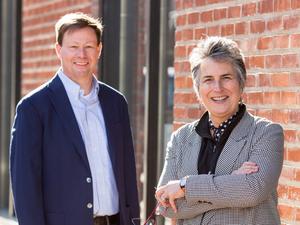
Venture capital investing in the Portland metro in the second quarter stayed in line with national trends, with the amount invested slipping but deal count remaining strong.
That means investors are pulling back how much they plow into companies but are still investing.
“It’s time for caution but not panic,” said Diane Fraiman, partner at Voyager Capital.
The data is based on the most recent Venture Monitor report by research firm PitchBook and the National Venture Capital Association. With inflation rising, Wall Street volatility that has closed the IPO window and the expectation of recession, the venture capital ecosystem is pulling back.
However, the report also notes that, since venture firms are still raising record amounts from limited partners, there's still capital to be had.
In the second quarter, $122.7 million was invested across 32 deals in the Portland metro. The deal count remained the same as in the first quarter but the amount invested dropped 42% sequentially.
Statewide investors put $286.8 million into 40 deals. The statewide number is higher due to the massive $150 million round raised by Corvallis-based Agility Robotics. That round, announced in April was the largest in the state for the quarter.
These are the three largest deals in the quarter for the Portland metro:
- $37 million raised by digital health startup Boulder Care.
- $23 million raised by wearable computer maker RealWear. The majority of this round was also included in Q1 data when the bulk of the round was raised.
- $15 million to cybersecurity startup ConductorOne.
Two of the largest rounds statewide were the $150 million to Agility Robotics and $11 million to Hood River-based Overwatch Imaging.
What advice are local investors giving founders
Locally, Oregon Venture Fund’s Eric Rosenfeld said he has seen slight drops in valuation and round sizes for portfolio companies and new companies pitching the fund, as the broader VC market has tightened. However, he noted revenue for portfolio companies hasn’t slowed as recession fears have grown.
“We’re advising founders, even if you’re performing well, please husband your cash and be prepared for the possibility of smaller checks and smaller valuation increases than you may have originally expected with your next financing,” Rosenfeld said.
Fraiman and the team at Voyager, which closed a $100 million fund in 2019, have been similarly advising startups to conserve cash.
“The reality is, for really early stage startups, which is what we have in town, it’s time to hunker down and preserve cash and focus on product and your business strategy,” she said. And for later stage companies her advice is the same she gave at the onset of the Covid-19 pandemic in 2020.
“Preserve cash and focus on economic and business metrics and milestones to ensure you are doing the smart stuff,” she said, adding that there is still money in the system to go into deals with strong fundamentals.
If anything, Fraiman said investing is getting back to the “old fashioned” way of thorough due diligence that some firms were leaving behind as the market got frothy and deal competition heated.
Do investors still have capital to invest?
One area Rosenfeld is watching is the fallout from the crash of cryptocurrency and related companies. He noted $30 billion was invested in crypto startups last year. The crash could have intense ripple effects in venture capital, more so than the correction in equity prices on Wall Street.
Nationwide, $62.3 billion was invested across 3,374 deals in the second quarter. That compares to $81.2 billion invested across 4,268 deals in Q2 last year.
The report notes that investors “dry powder,” or the amount they have still on hand to invest, is a possible bright spot in that it highlights while there is still capital available, it might not be as exuberant as prior years.
“As the market continues to react to volatility over the past six months, the venture ecosystem demonstrates strength as dry powder reaches new heights and fundraising levels surpass more than $100 billion for the second consecutive year,” said PitchBook CEO John Gabbert in a written statement.
Local investors are in fundraising mode as well. We’ve caught up with several over the last year who are raising or just collected their largest funds to date. Portland Seed Fund is targeting a $20 million third fund. Rogue Venture Fund is targeting a $30 million fourth fund and Elevate Capital is targeting $40 million second fund. Bend-based Cascade Seed Fund raised a $10 million second fund.
This year, Oregon Venture Fund raised its largest fund ever at $15 million.
“While it may appear to be a scary time to be backing new startups, downcycles historically are positive for early-stage VCs — that is, VCs with the limited partner support and resolve to benefit from more reasonable valuations and the business opportunities uncovered during times of economic disruption,” said Rosenfeld.








